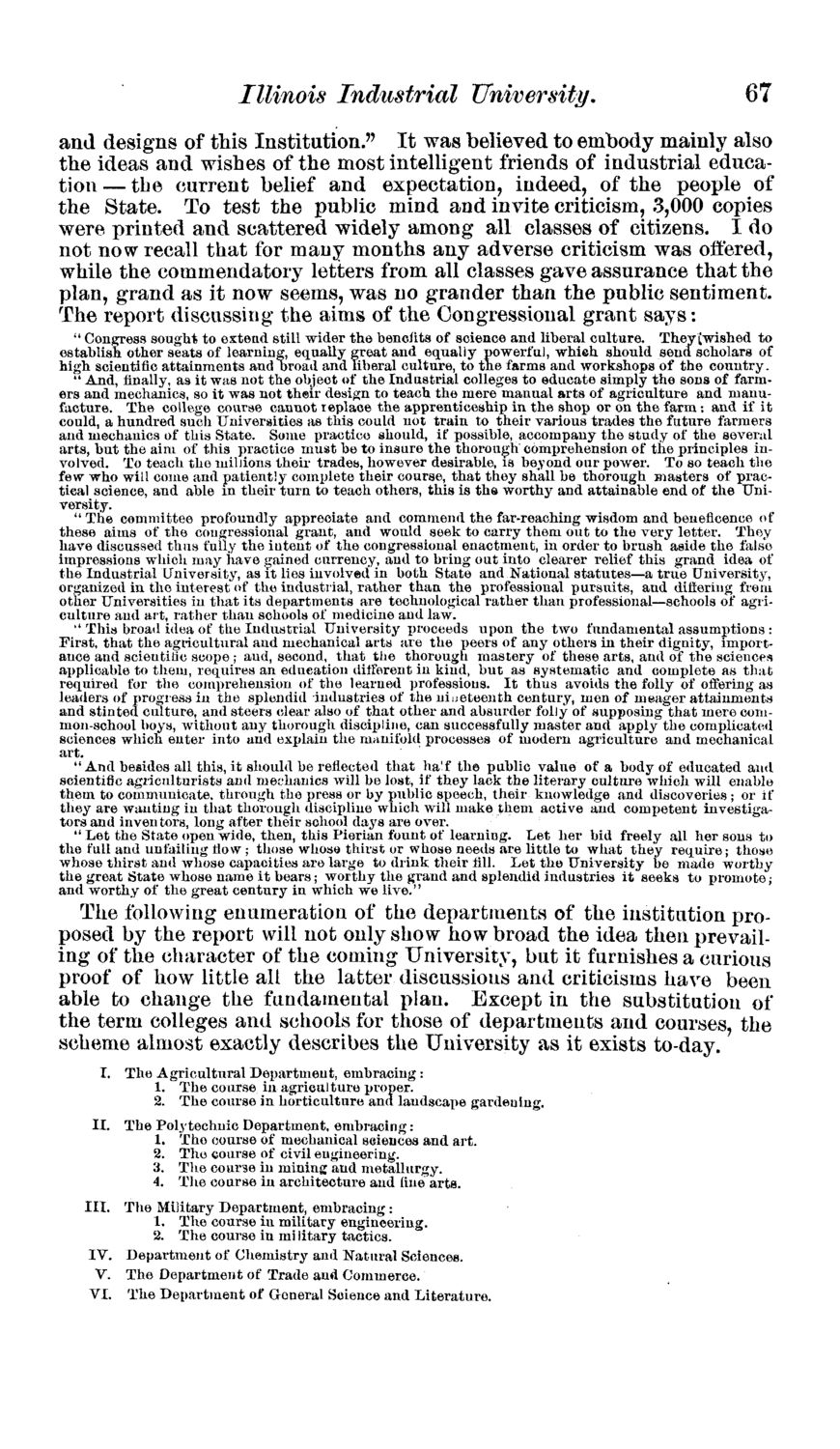| |
| |
Caption: Board of Trustees Minutes - 1874
This is a reduced-resolution page image for fast online browsing.

EXTRACTED TEXT FROM PAGE:
Illinois Industrial University. 67 and designs of this Institution." I t was believed to embody mainly also the ideas and wishes of the most intelligent friends of industrial education— tbe current belief and expectation, indeed, of the people of the State. To test the public mind and invite criticism, 3,000 copies were printed and scattered widely among all classes of citizens. I do not now recall that for many months any adverse criticism was offered, while the commendatory letters from all classes gave assurance that the plan, grand as it now seems, was no grander than the public sentiment. The report discussing the aims of the Congressional grant says: " Congress sought to extend still wider the benefits of science and liberal culture. They (wished to establish other seats of learning, equally great and equally powerful, which should send scholars of high scientific attainments and oroad and liberal culture, to the farms and workshops of the country. " And, finally, as it was not the object of the Industrial colleges to educate simply the sons of farmers and mechanics, so it was not their design to teach the mere manual arts of agriculture and manufacture. The college course cannot replace the apprenticeship in the shop or on the farm ; and if it could, a hundred such Universities as this could not train to their various trades the future farmers and mechanics of this State. Some practice should, if possible, accompany the study of the several arts, but the aim of this practice must be to insure the thorough comprehension of the principles involved. To teach the millions their trades, however desirable, is beyond our power. To so teach the few who will come and patiently complete their course, that they shall be thorough masters of practical science, and able in their turn to teach others, this is the worthy and attainable end of the University. " The committee profoundly appreciate and commend the far-reaching wisdom and beneficence of these aims of the congressional grant, and would seek to carry them out to the very letter. They have discussed thus fully the intent of the congressional enactment, in order to brush aside the false impressions which may have gained currency, and to bring out into clearer relief this grand idea of the Industrial University, as it lies involved in both State and National statutes—a true University, organized in the interest of the industrial, rather than the professional pursuits, and differing from other Universities in that its departments are technological rather than professional—schools of agriculture and art, rather than schools of medicine and law. u This broad idea of the Industrial University proceeds upon the two fundamental assumptions : First, that the agricultural and mechanical arts are the peers of any others in their dignity, importance and scientific scope ; and, second, that the thorough mastery of these arts, and of the sciences applicable to them, requires an education different in kind, but as systematic and complete as that required for the comprehension of the learned professions. I t thus avoids the folly of offering as leaders of progress in the splendid industries of the nineteenth century, men of meager attainments and stinted culture, and steers clear also of that other and absurder folly of supposing that mere common-school boys, without any thorough discipline, can successfully master and apply the complicated sciences which enter into and explain the manifold processes of modern agriculture and mechanical art. " A n d besides all this, it should be reflected that ha'f the public value of a body of educated and scientific agriculturists and mechanics will be lost, if they lack the literary culture which will enable them to communicate, through the press or by public speech, their knowledge and discoveries; or if they are wanting in that thorough discipline which will make them active and competent investigators and inven tors, long after their school days are over. " Let the State open wide, then, this Pierian fount of learning. Let her bid freely all her sons to the full and unfailing flow ; those whose thirst or whose needs are little to what they require; those whose thirst and whose capacities are large to drink their fill. Let the University be made worthy the great State whose name it bears; worthy the grand and splendid industries it seeks to promote ; and worthy of the great century in which we live." The following enumeration of the departments of the institution proposed by the report will not only show how broad the idea then prevailing of the character of the coming University, but it furnishes a curious proof of how little all the latter discussions and criticisms have been able to change the fundamental plan. Except in the substitution of the term colleges and schools for those of departments and courses, the scheme almost exactly describes the University as it exists to-day. I. The Agricultural Department, embracing: 1. The course in agriculture proper. 2. The course in horticulture and landscape gardening. II. The Polytechnic Department, embracing: 1. The course of mechanical sciences and art. 2. The course of civil engineering. 3. The course in mining and metallurgy. 4. The course in architecture and fine arts. I I I . The Military Department, embracing : 1. The course in military engineering. 2. The course in mi litary tactics. IV. Department of Chemistry and Natural Sciences. V. The Department of Trade and Commerce. VI. The Department of General Science and Literature.
| |